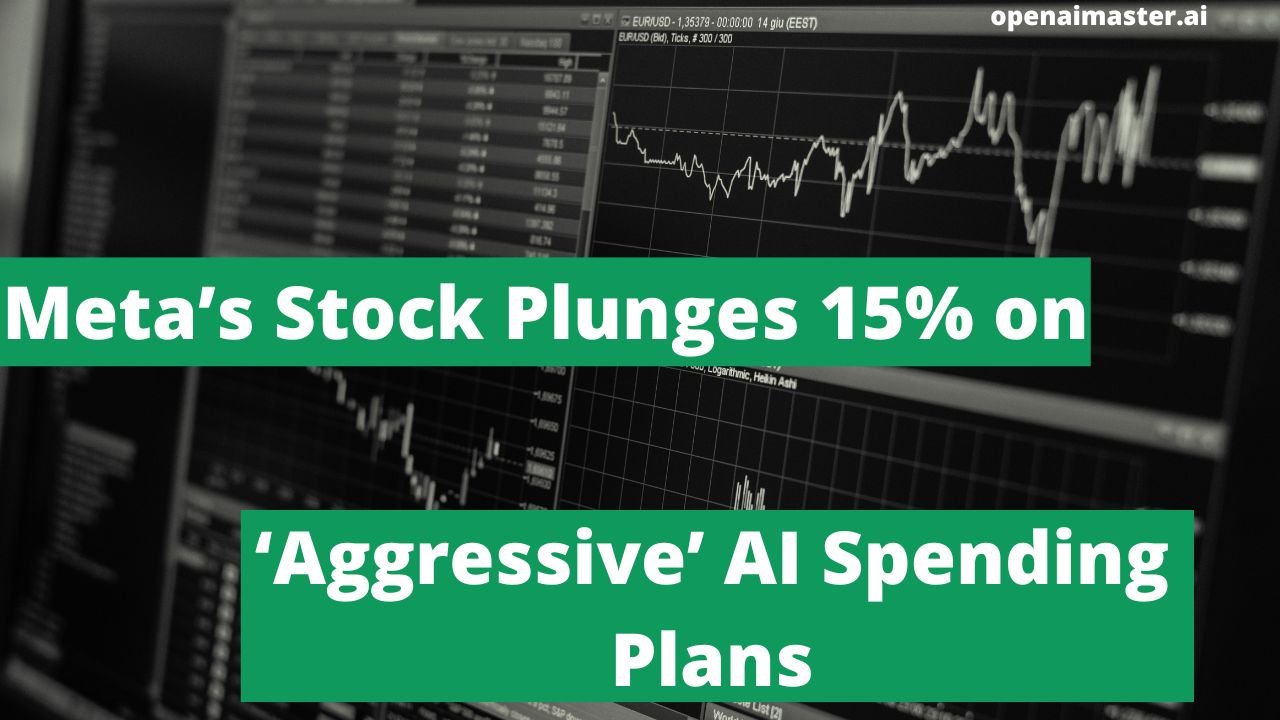Meta, the social media giant behind Facebook, Instagram, and WhatsApp, found itself in the eye of a Wall Street storm on Thursday as investors reacted with trepidation to the company’s ambitious plans to invest aggressively in artificial intelligence (AI). Meta AI stock plummeted by as much as 15%, erasing a staggering $183 billion from its market capitalization.
The selloff, which began in after-hours trading on Wednesday, came as investors looked beyond Meta’s strong first-quarter earnings and zeroed in on the astronomical costs associated with building an AI-powered future. While the potential rewards of harnessing AI are immense, Meta’s latest earnings report underscored the significant investments required to develop cutting-edge AI tools and infrastructure, a commitment that will take time to bear fruit.
At the heart of the investor concerns lies Meta’s intensifying competition with tech titans like Microsoft and Google in the race to unlock the boundless potential of AI. These companies are locked in a high-stakes battle to develop the most advanced AI models and services, a contest that demands substantial financial resources and technological prowess.
During Wednesday’s earnings call, Meta CEO Mark Zuckerberg left no doubt about the company’s ambitions, declaring Meta’s intention to become “the leading AI company in the world.” Zuckerberg emphasized the need for significant and sustained investment over the coming years to build even more advanced AI models and services at an unprecedented scale.
While Meta’s resources are vast, the company’s bold AI plans have sparked concerns among investors about the potential strain on its finances. Meta revealed that its full-year capital expenditure would now range from $35 billion to $40 billion, up from previous guidance of $30 billion to $37 billion. This increase is primarily driven by the need to accelerate infrastructure investments to support Meta’s AI roadmap.
Moreover, the company acknowledged that capital expenditures would continue to rise in the following year, as the AI push intensifies. This open-ended commitment to spending has unnerved some shareholders, who fear that Meta’s resources, while substantial, may not be infinite.
“The language around spending plans has become bolder once more, and this could be what’s spooking markets,” said Sophie Lund-Yates, lead equity analyst at Hargreaves Lansdown. “For all Meta’s bold AI plans, it can’t afford to take its eye off the nucleus of the business — its core advertising activities… Meta’s resources are vast but not infinite, and its digital advertising market share needs defending at all costs.”
Zuckerberg sought to assuage investor concerns by highlighting Meta’s strong track record of monetizing its services effectively once they reach scale. He acknowledged that spending would grow “meaningfully before we make much revenue from some of these new products,” but expressed confidence in Meta’s ability to generate revenue from its AI initiatives, whether through business messaging, advertising in user interactions with chatbots, or charging for access to larger AI models.
However, weaker-than-expected guidance for the current quarter, with Meta forecasting revenue between $36.5 billion and $39 billion, versus analyst expectations of $38.2 billion, added to the investor jitters.
Analysts at JP Morgan promptly cut their December 2024 price target for Meta’s stock from $580 to $480, reflecting the increased uncertainty surrounding the company’s future performance.
Despite the market turmoil, some industry experts have defended Meta’s AI gambit, arguing that the potential rewards justify the risks. “Mark Zuckerberg’s ‘heads-up’ was reminiscent of what he once said about the metaverse. That didn’t exactly go so well, but this is different than Meta’s metaverse gamble because AI has real and practical use cases now,” said Mike Proulx, director at Forrester Research.
Proulx suggested that Meta’s AI initiatives could divert resources from its struggling metaverse efforts, stating, “The question remains whether Meta can contend in the AI race while maintaining a strong financial position. To do this, expect to see more ‘metaverse’ resources diverted from Reality Labs to Meta’s AI initiatives.”
As the dust settles from Thursday’s dramatic selloff, the tech world will be closely watching how Meta navigates the treacherous waters of the AI arms race. The company’s ability to balance its AI ambitions with financial prudence and sustained profitability will be a crucial test for Zuckerberg and his leadership team.
In the rapidly evolving AI landscape, where fortunes can shift overnight, Meta’s bold gambit has raised the stakes and intensified the competition. Whether this gamble pays off or backfires spectacularly remains to be seen, but one thing is certain: the AI race has entered a new, high-stakes phase, and Meta’s future hangs in the balance.

